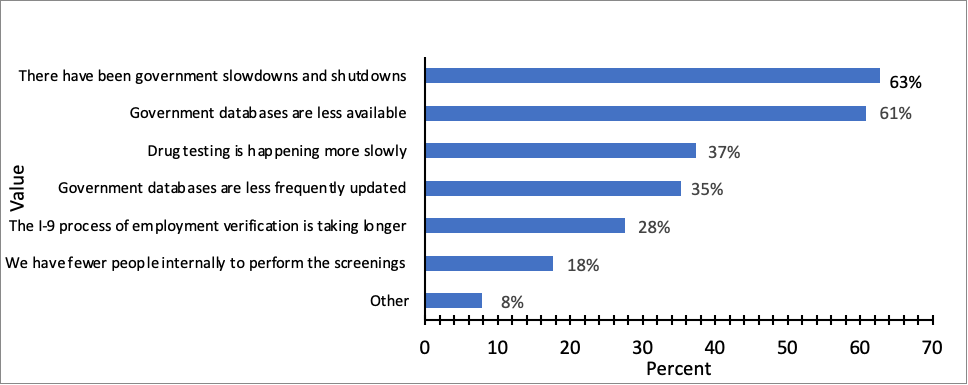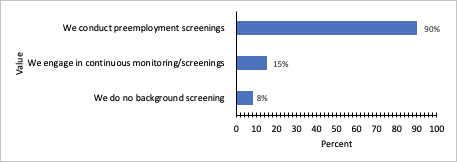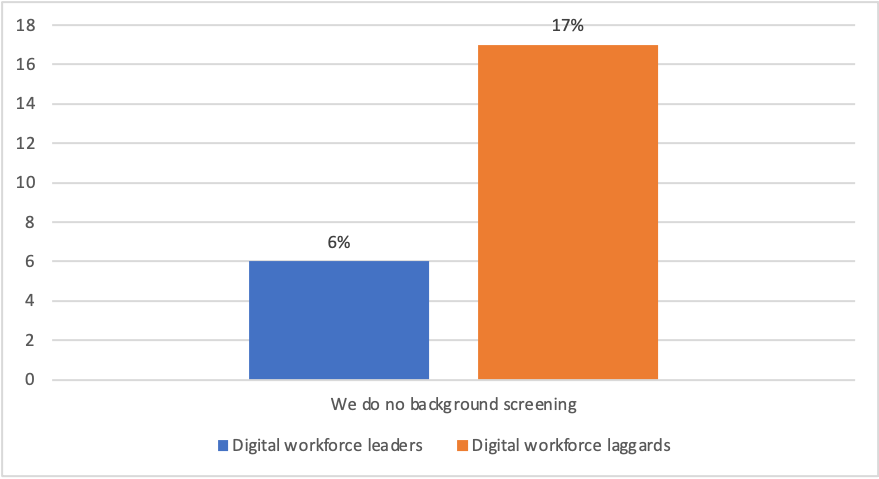Major Finding Six: The pandemic made background checks more challenging.
- Nearly a third (29%) say individual background screenings are taking longer than they did before.
- Eight percent are not conducting background checks at all and 18% indicate their organizations have fewer people to conduct those screenings.
- Nearly a quarter are more concerned about identity theft due to the Covid-19 pandemic.
Nearly one-third say background checks are taking longer than prior to Covid-19.
Respondents indicate that individual background screens are taking longer. This is understandable given that fewer companies and government employees regularly went into their physical offices and some government agencies verifying criminal records, for example, were temporarily closed.
The primary reasons for background checks taking longer, according to our respondents, are:
- government slowdowns and shutdowns (63%)
- government databases are less available (61%)
Survey Question: Why do you think background screening is taking longer in your organization? (select all that apply)

While the early months of the pandemic saw many people out of work and eagerly searching for new opportunities, the labor market has become far tighter since then with varying opinions on why this is the case. Regardless of the reasons, though, the reality for recruiters, HR, and hiring managers is a hot war for talent. Often, top talent accept jobs with the first organization to make a move. If background checks are stagnating, there is the potential for candidates to move forward with other organizations.
Other COVID-related complications impact background checks.
Drug screenings have also experienced slowdowns during the pandemic; 37% of respondents indicate that drug testing is happening more slowly. This slowdown is likely due, in part, to processing facilities closing and reducing hours of operation.
Companies also reported issues with the I-9 verification process; 28% say employment verification is taking longer than expected. While some employers during the pandemic were given temporary exemptions to the requirement to view employee documents in person, others are being challenged due to the closing of offices and many employees working from home.
The mass exodus of employees to remote environments creates additional challenges as well; 18% of respondents indicate that they now have fewer people available to perform background screening tasks.
In what may be a risky move, 14% of our respondents indicate that they are doing fewer background checks overall. Interestingly, though, only 4% of these respondents say they are doing fewer because they now take longer.
Smaller organizations (19%) are more likely than large (4%) and mid-size (5%) to say they don’t do any background screening. They also are less likely (79%) than large (95%) and mid-size (94%) organizations to conduct pre-employment screenings.
Continuous background screening is relatively uncommon.
Although the vast majority of employers today (90%) conduct pre-employment screenings, only 15% of respondents say their organization continuously monitors and screens employees.
Survey Question. How does your organization conduct background screenings? (select all that apply)

Continuous background checks occur after a new hire’s first day on the job. They can occur at “set intervals” during an employee’s life-cycle or randomly (e.g., periodic drug screening for drivers). Some industries that traditionally screen continuously have employees whose work requires them to interact more with consumers and the public (e.g., healthcare, security, and transportation).
Other concerns related to sexual harassment, discrimination, and safety, has prompted other companies to consider continuous screening (e.g., retailers, public school systems, and manufacturers.
Digital workforce leaders (those who “strongly agree” and “agree” that their managers are getting all of the tools, technology, education and training to manage the remote workforce—including access to effective and timely background checks) are far more likely to conduct background checks than digital workforce laggards.
Survey Question: How does your organization conduct background screenings? (select all that apply)

Digital workforce leaders use pre-employment screens more often. In fact, digital workforce laggards are almost three times as likely to say that they do no background screening at all (17% vs. 6%).
Clearly, the effective use of background checks, especially in an increasingly remote work world, is a best practice that top companies recognize they can’t afford to overlook.
In our next post, we take a look at our seventh major finding: organizations that arm their managers with the technology, tools, education, and training they need to support a remote workforce and reap rewards.



